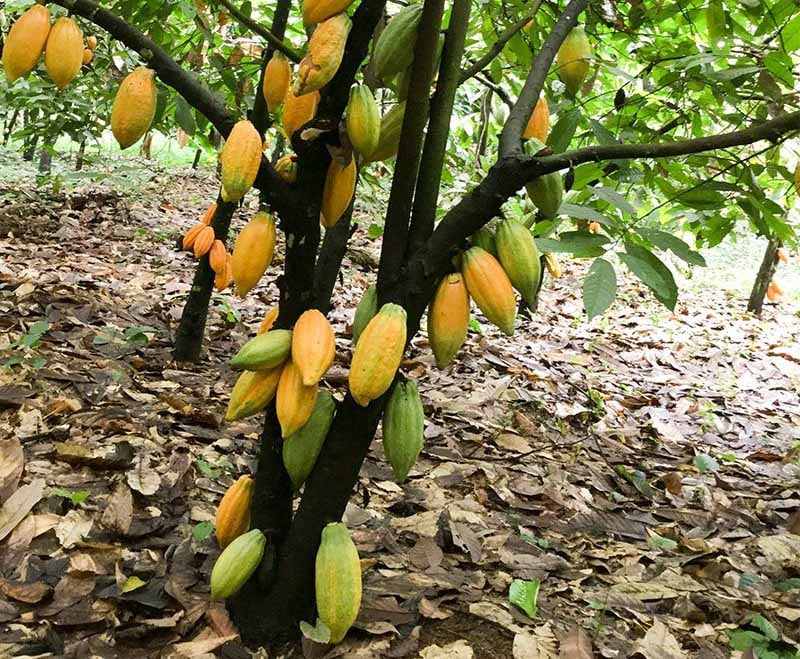Prime
Mayuge embraces cocoa growing to boost food security

- Harvesting of immature cocoa and compromise in quality, which hinders good prices at international markets, will be eliminated. PHOTO/ABUBAKER KIRUNDA/TAUSI NAKATO
What you need to know:
- Cocoa is Uganda’s fourth-biggest commodity export, after coffee, tea and fish.
Authorities in Mayuge District have launched a campaign to promote cocoa growing in the area to boost food security.
The District Agriculture Officer, Mr Emmanuel Kawuzi Waiswa, says the decision follows a discovery that cocoa plants perform better when inter-cropped with bananas.
“Unlike sugarcanes, cocoa plants create room for the growth of banana plants which are used as food; therefore, we have decided to promote its growth to boost food security,’’ he told Monitor recently.
Mr Waiswa says Swisscontact, a Non-Governmental Organisation from Netherlands, has signed a Memorandum of Understanding (MoU) with the District for funding of the activities to popularise the growth of this perennial crop.
According to Mr Waiswa, who doubles as the District Cocoa-growing Focal Person, about 7,000 farmers have been registered for this programme which is being piloted for a period of four years.
He adds that Swisscontact has set an open budget based on the needs assessment for funding.
Mr Waiswa further explained that since cocoa is a perennial crop which takes up to 3 years to harvest, farmers have been given Sass chicks, which grow within four months, to help them earn a living.
In this way, he says harvesting of immature cocoa and compromise in quality, which hinders good prices at international markets, will be eliminated.
Mr Waiswa says a kilogramme of cocoa beans currently costs Shs9,000 at Esco stores being run by American nationals in Mayuge District; however, the Swedish funders are set to expand cocoa growing to other Districts in Busoga Sub-region to increase production.
He added: “Mayuge District, together with the Swisscontact partners and other stakeholders, are set to organise a regional showcasing for growing the cocoa plant this October in order to popularise its growth.”
Mr Waiswa says he is optimistic that cocoa growing will succeed in Mayuge District because the soils are conducive for its growth, the few agriculture extension workers notwithstanding.
However, he says, 50 cocoa community-based facilitators have been trained to help in sensitising residents about cocoa growing in each of the ten Sub-counties selected for piloting of its growth.
Timely
The development comes at a time when the government has embarked on a Bill to regulate the Cocoa value chain and enhance production, productivity, and improve harvest and post-harvest quality practices and standards.
Speaking to Monitor at Uganda Coffee Development (UCDA) regional offices, Ms Doreen Rweihangwe, the Principal Quality Controller, said they are working on a robust legal, regulatory and institutional framework for cocoa.
She said: “The government wants UCDA to start regulating cocoa. A regulatory Impact Assessment is already at Parliament to see how coffee and cocoa can go together to ensure that quantity, quality and production are maintained.”
According to Ms Rweihangwe, cocoa is mostly grown in the districts of Mayuge, Buikwe, Mubende and Bundibugyo; however, farmers have not been earning off it because it has not been regulated.
“We want farmers to start accessing the market for cocoa, we want to regulate its quality to the international standards because 75 per cent is exported to European countries,’’ she added.
Mr Jonathan Abaho, the Quality Assurance Officer at UCDA, says the ongoing plans by the government to incorporate cocoa into UCDA will enable farmers to earn a lot of profits compared to other crops like sugarcane which can’t support inter-cropping.
Ms Justine Niyonzima, the Project Assistant of the Coffee and Cocoa Value Chain Development Project, says they are to train cocoa farmers on good agronomist practices, post-harvest handling and ensuring that they access good quality seedlings.
About cocoa
Cocoa is a perennial crop that responds well in rainy tropical areas, with a maximum annual average of between 30 and 32º C; it thrives under shades and in areas with annual rainfall between 1,500mm and 2,000mm.
In Uganda, cocoa is grown in a number of districts where the conditions are suitable for its cultivation, mainly the Central, Western, South-Eastern and South-Western regions, and some parts of the Eastern region, mainly in the Busoga Sub-region.
Cocoa is Uganda’s fourth-biggest commodity export, after coffee, tea and fish.




